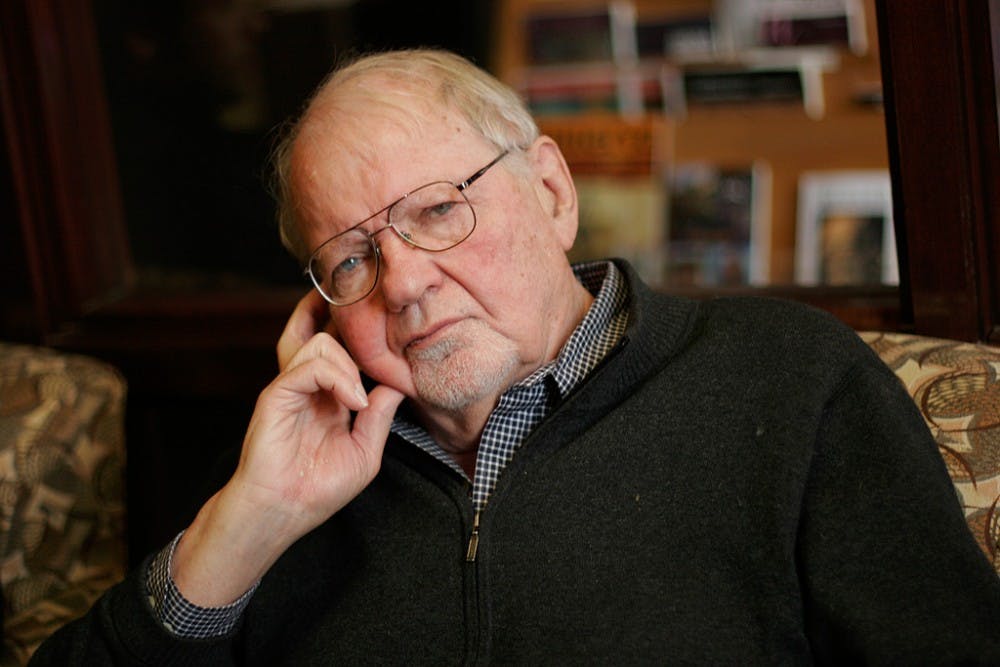Fredric Jameson,William A. Lane Jr. professor of comparative literature and romance studies, is one of today’s preminent voices on literary theory and Marxian cultural analysis as well as author of Postmodernism, or the Cultural Logic of Late Capitalism. In an office with a typewriter, no computer and floor-to-ceiling books in at least five different languages, Towerview’s Brian Contratto sat down with the professor to talk about trends in philosophy, Duke and Ke$ha.
You studied in Europe at an influential time. How did your theories of philosophy integrate themselves into literature departments at American universities?
It was a time when—in the ’50s—English departments were not reading anything modern. At my college they didn’t even teach Joyce and Ulysses; in French departments we were reading all kinds of new stuff and my background was in Sartre and Sartrean Existentialism. I think what I was interested in was the link between literature and philosophy. For me, Sartre was such an example—both a philosopher and a literary writer. That seemed to me a much more interested way of putting together an intellectual field of thought than literary specializations that focus mainly on poetic texts.
What were the major differences in focus between Continental [European] Philosophy and the literature studies in the United States?
In English departments over here the topic was really literature in a very narrow fashion. It was not mass culture and it was not even film. It was only tangentially “philosophy.” In those days what they called interdisciplinary studies was when a philosopher and a literary critic came up to either side of the fence and exchanged views with each other.
And how were the controversial figures, Freud and Marx, revitalized?
The ’60s and ’70s saw a “Freudo-Marxism” that was concerned with both the analysis of the individual and theory of society. There was a whole “popular Freudianism” in the ’60s. With Alfred Hitchcock’s Spellbound, a pop Freudianism. And this was a country of therapies—more even now than then. You had Woody Allen’s jokes about his analyst, and so forth. Everyone was interested in this kind of therapy.
But this was also a prosperous period in American life—there were not, essentially, economic threats for the country, though the ’60s brought all kinds of revolts against authority and constraints and so forth. There were not very many Marxists in the university—it was a very narrow and specialized thing. The Communist party had really lost its authority since the Stalin-Hitler pact. No one expected interesting new philosophical perspectives coming from the Soviet or Communist parties, but in the ’60s there was a new kind of interest, a very intellectual relation with the Frankfurt School.
And now you see Marxian and Freudian linguistic influences in a bunch of academic departments, including social sciences and philosophy.
You don’t need the slogan of ‘interdisciplinarity;’ it’s all become more open. And this reflects in that some of the biggest drawing theory courses are film courses. It’s only with the ’60s that the barriers broke down between these things. As for popular culture, our first television sets were in the late ’40s. The programs began to get much more sophisticated and there began to be arguments about the influence of media culture: Was it a force for conformity? Would it be possible to have within the culture of the media and television things that were more radical politically and subversive? There were a lot of examples [to the contrary]. When the Nazis pioneered a lot of media experiments—television use in the Olympics in 1936—the Left felt that the impetus was reactionary.
In the ’60s people began to think that it could be liberating—the fact that the Vietnam War was televised. The most striking thing was to see a Vietnamese commander killing a kneeling Viet Cong. It became clear that the media could have the effect of shock and transformation.
So the political potential might have vindicated television, but what about pure pop and commercial art? You have philosopher Slavoj Zizek who’s apparently friends with Lady Gaga, and Vanity Fair joking about a friendship between you and Ke$ha.
Well with Zizek’s mind, everything is grist for his mill — he just published a huge book on Hegel — all subject to his philosophical investigation. I think the objections to popular culture [as an object of analysis] were in those days that it was too simple, formulaic… You wouldn’t say that about Hollywood films but television was much more primitive. But it isn’t anymore. Nobody has to apologize for studying The Wire.
What do you mean when you speak of postmodernism, and does the title still apply today?
I’m thinking of it as a period, not stylistically. It’s not just a fashion, but a whole new historical moment. You could describe it in terms of the computer, or globalization — or in terms of deregulation by Reagan and Thatcher in the Anglo-Saxon world. Little by little that spreads to the whole world. Computerization is certainly a sign: It’s changed our relationship with language and consumption objects. That’s one way of describing it. It’s hard to see what this could turn into. We’re seeing a lot of convulsions in the system—does it mean we’re at an end? Systems can evolve, but do they really change without some cataclysmic event?
If you talk about sit-ins, the occupation of a factory — well there aren’t any factories any more — but the Occupy movement is kind of a variant. And the Wisconsin union protests — these are two very important moments. All that is building up and now there are — what do you call these new things with your cell phones — flash mobs. All those are political possibilities that haven’t been fully explored. As in Egypt, you can win with mass crowds but what after that? That’s the point: We can’t really predict where it will end.
Get The Chronicle straight to your inbox
Signup for our weekly newsletter. Cancel at any time.

